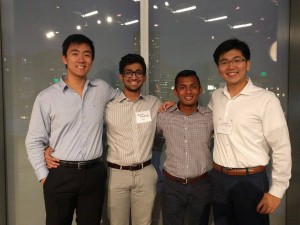
Jack Chang, Mustafa Neemuchwala, Rahul Gupta and Mickey Li
Teams of BHP students have been competing in case competitions and stock pitch competitions near and far. Mickey Li and Rahul Gupta won first place at the MIT Fall Intercollegiate Trading Competition in the Foreign Exchange Competition, beating teams from Harvard, Stanford, MIT and other top universities. Mickey and Rahul used skills they learned from trading internships and the Undergraduate Computational Finance student organization to beat their competition during the multiple sessions of electronic trading and floor trading.
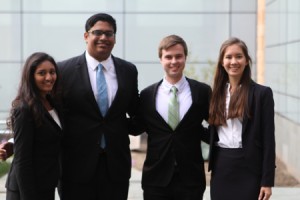
Srija, Karna, Austin and Megan
An all-BHP team comprised of sophomores Megan Tran-Olmsted, Srija Nalla and Karna Venkatraj, and junior Austin Partridge, participated in the Michigan Undergraduate Investment Conference at the University of Michigan through the University Securities Investment Team. The team competed in a trading simulation game and a comprehensive stock pitch, taking third place.
BHP juniors Eric Saldanha and Abhishek Ramchandani traveled to the University of Arizona for the Eller Ethics Case Competition in October. The case covered the dispute between Apple and the FBI surrounding the San Bernadino case. Competitors were asked to consider ethical, legal and financial considerations of Apple’s response and make a recommendation for future disputes with the FBI. Eric and Abhishek created an ethical framework for Apple drawing from the company’s core values as well as fundamental concepts in ethics and business law. They also proposed the creation of a Privacy Oversight Committee within Apple that would review government requests and make recommendations.
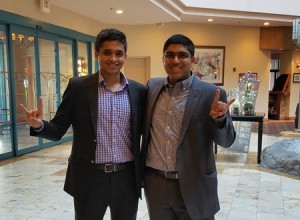
Abhishek and Eric
The team did not advance to the finals, but they were happy to have competed and valued the learning opportunity. “We had never competed in an ethics case competition and it presented questions that we had never thought of before,” said Eric. “Not only did we have to think about whether Apple’s actions harmed national security, we had to evaluate whether Apple even has an obligation to protect national security in the first place. We also had to evaluate which was more egregious from and ethical perspective: harming national security interests, or harming consumer privacy rights.”
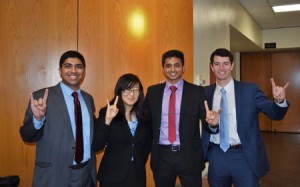
Eric, Diane, Abhishek and Travis
After returning from Arizona, Abhishek and Eric once again competed in another event, the McCombs Fall Case Competition hosted by the Undergraduate Business Council. Their team also included BHP junior Diane Sun and BBA senior Travis Monteleone. Their team, Pacific Solutions, took first place in that competition and will be going on to represent McCombs at the University of Southern California’s national case competition.
BHP is grateful to the alumni who support our program. Your generous contributions help us sponsor students to attend case competitions across the United States and even abroad.

 BHP senior Nadia Senter has wanted to work in the music industry since high school. She got her wish when she landed a coveted internship with the Grammys, which then led to an even more coveted internship with
BHP senior Nadia Senter has wanted to work in the music industry since high school. She got her wish when she landed a coveted internship with the Grammys, which then led to an even more coveted internship with 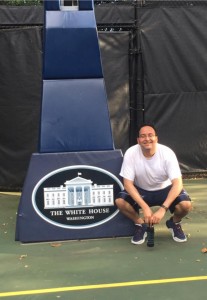 Bhargav Srinivasan, BHP ’12, is in his second year of a four-year JD/MBA joint degree program at Harvard. This past summer, he worked at the White House as an intern in the National Economic Council (NEC), working on finance policy for the Obama Administration.
Bhargav Srinivasan, BHP ’12, is in his second year of a four-year JD/MBA joint degree program at Harvard. This past summer, he worked at the White House as an intern in the National Economic Council (NEC), working on finance policy for the Obama Administration.